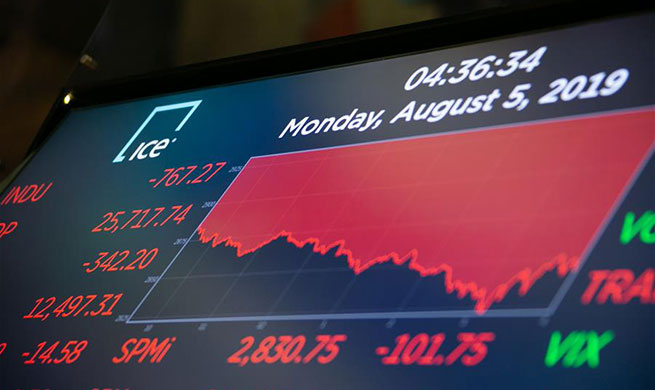NEW YORK, Aug. 6 (Xinhua) -- Although China's currency broke through the psychological barrier of seven yuan per U.S. dollar (USD), analysts have cautioned against a hasty conclusion that the depreciation of the Chinese yuan (CNY) is a sign of competitive devaluation.
"This looks more like a warning shot than active devaluation," strategists at Swiss investment bank UBS said in a note, adding that the CNY's fall is a reflection of economic fundamentals and tariff risks.
China is aware that holding CNY-USD exchange rate at any particular level is counterproductive and that depreciating the currency could bring negative costs, said Alejo Czerwonko, executive director of Emerging Markets Investment Strategy at the Chief Investment Office of UBS Global Wealth Management.
China's central bank, the People's Bank of China (PBOC), on Monday reiterated that it is confident in its capability of keeping the CNY's exchange rate basically stable after the CNY, both onshore and offshore, broke seven against the USD.
The PBOC attributed the weakening of the currency to factors including unilateral and protectionist measures, as well as the expectation of additional tariffs on Chinese goods.
Noting the PBOC's online statement, Czerwonko said the central bank does not want to completely unhinge market expectations of CNY stability even though it is letting market forces push the USD-CNY exchange rate above 7.
Analysts have pointed out that the CNY's fall was the result of the law of the market.
Stephen Gallagher, chief U.S. economist at financial services company Societe Generale, said U.S. tariffs and concerns they triggered for the United States and China are naturally pushing down the CNY, and China is not defending the currency.
Noting that tariffs normally strengthen the currency that imposes the tariffs, Gallagher said in this case, the United States is imposing tariffs and there is a natural reaction for the USD to strengthen.
The U.S. Treasury Department on Monday labelled China a "currency manipulator." Analysts said the logic is unconvincing.
"The immediate and, for that matter, future economic and trade consequences are limited," Steve Englander, head of both G10 FX Research and North America Macro Strategy at Standard Chartered, said Monday in a note.
"The currency manipulation laws were written when trade discussions were far less charged than they are now and were probably not meant to be used as aggressively as the Administration would like," Englander said.
However, he added that the market reaction is likely to add to pressures on risk-correlated assets and expectations of accelerated monetary easing measures from the U.S. Federal Reserve.
Henry Huang, professor at the Sy Syms School of Business at Yeshiva University, said by designating China as "currency manipulator," the United States aims to put maximum pressure on China and gain an upper hand during trade talks.
He said he doubted the United States will impose immediate sanctions on China. Such a move would be a huge threat to global trade and U.S. companies' profitability because the United States appears to want to escalate trade tensions at all costs, Huang said.
The U.S. Treasury's action "is more symbolic than anything at this point and aimed at Trump's hard core political base that he will need to shore up now that the economy is broadly decelerating in part due to the trade conflict," U.S. political news outlet Politico quoted Joe Brusuelas, chief economist at the multi-national network of accounting firms RSM, as saying.
Brusuelas said it marks the start of a process that may end in the Trump administration attempting to devalue the USD.













